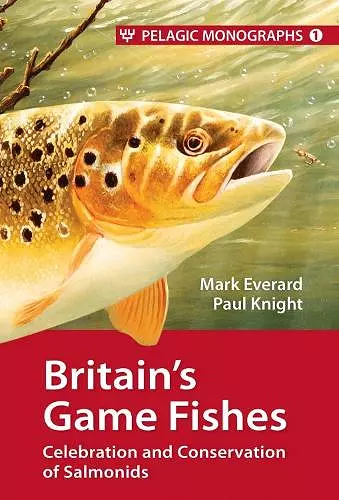Britain’s Game Fishes
Celebration and Conservation of Salmonids
Mark Everard author Paul Knight author
Format:Hardback
Publisher:Pelagic Publishing
Published:25th Mar '13
Currently unavailable, and unfortunately no date known when it will be back

Game fishes, particularly those of the salmon family, are critical indicators of the health of those ecosystems upon which we now know we are dependent. As the authors of this important environmental book argue, “Our game fishes [then] serve as more than merely an indicator of healthy waters. Instead, they can be regarded as iconic of the ecosystems in which they occur.” Moreover, “the quality requirements of different types of fish population have formed the backbone of a great deal of water management in the UK, Europe and the USA over several decades.”
With sections on how and why Britain’s game fishes are under pressure from changes in land use, agriculture, housing needs, etc. – and their concomitant pollution effects – this book assesses how our knowledge of these game fishes reflect the changing values we place on our surrounding wildlife.
One of the latest books (at least to cross my desk) from the very prolific Mark Everard is Britain's Game Fishes which he has coauthored with Paul Knight. The subtitle is celebration and conservation of salmonids, and indeed it is a celebration written in an engaging style and attempting the all-encompassing. As a life member and former council member of the Freshwater Biological Association, Mark probably needs little introduction in terms of his credentials to write about fish. What works particularly well for me at least in this book is his collaboration with Paul presumably initiated through the fisheries environmental charity, the Salmon & Trout Association (S&TA). Paul is currentlv the Chief Executive while Mark acts as a science advisor to the S&TA, a body that has been extremely influential in lobbying government departments and agencies to follow policies that protect aquatic environments for all dependent species, not just salmonids.
The content is divided into three broad sections. The first provides a general introduction to the native game fishes of the British lsles, spanning salmon, brown trout, grayling and the whitefishes, and with a quick nod to the familiar alien, the rainbow trout. For me, embroiled in fundamental science from day to day, I was a little disappointed with these short chapters. Of course, much of the generic content on life cycles etc can be gleaned from the numerous books covering 'fish of the British lsles' but I was expecting more detail on the wealth of recent research on the functional role of salmonids within aquatic ecosystems, and more perhaps on where our anadromous fish get to on their migrations that we have learned from large scale studies in the last decade. As a specific example, approximately 50% of the space discussing the role of Atlantic salmon was given over to the interaction with pearl mussel, which whilst of interest, does not match its role as predator, prey, host to parasites, and conveyor of productivity from marine to freshwater ecosystems, and which onlv warrants one sentence.
That minor gripe aside, the following two sections really comprise the 'meat' of the book and these focus on past and current pressures, and the outlook for the future. lt is here that Mark and Paul's combined wide-ranging knowledge brings all the historical, cultural, and environmental aspects from the truly global to the very local, into perspective and in a comprehensive yet accessible format. The final section on changing rules, changing values, and people power highlighted by the sterling work of organisations such as the Wild Trout Trust and the numerous Rivers Trusts for example, brings the content bang up to date and back onto one's doorstep to assess and reflect upon 'what our game fishes have ever done for us'. While the book is clearly not aimed at the salmonid researcher, as a case study of environmental pressures on iconic species and what we can do about them, it is certainly an accomplished piece of work and an enjoyable read from cover to cover.
-- Jon Grey * Freshwater Biological Association NeISBN: 9781907807350
Dimensions: unknown
Weight: 670g
240 pages